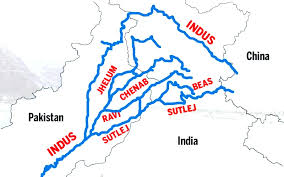Indus Water Treaty:

A Pakistani delegation recently arrived in Jammu as part of ongoing discussions concerning the 1960 Indus Water Treaty (IWT).
- Indus Water Treaty (IWT) is a treaty signed between India and Pakistan regulating the use and distribution of the Indus River system.
- It was signed by then-Prime Minister Jawaharlal Nehru and former Pakistan President Ayub Khan in 1960.
- The treaty was brokered by the World Bank, which too is a signatory to the treaty.
- The pact sought to divide the water of the Indus River and its tributaries (Sutlej, Beas, Ravi, Jhelum, and Chenab) equitably among the two countries.
- Under the treaty, water from three eastern rivers, Beas, Ravi and Sutlej, was allocated to India, and water from the three western rivers – Chenab, Indus and Jhelum were allocated to Pakistan.
- Pakistan roughly got 80% of the water in the Indus drainage system.
- The treaty also permits both countries to use the other’s rivers for certain purposes, such as small hydroelectric projects that require little or no water storage.
- The treaty is overseen by the Permanent Indus Commission (PIC), a bilateral body with commissioners from both countries tasked with implementing and managing treaty provisions, and resolving any questions, differences, or disputes that may arise.
- The World Bank’s role is to appoint a neutral expert in case of ‘technical’ differences, failing which the differences escalate to a dispute for international arbitration.




